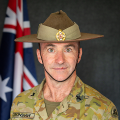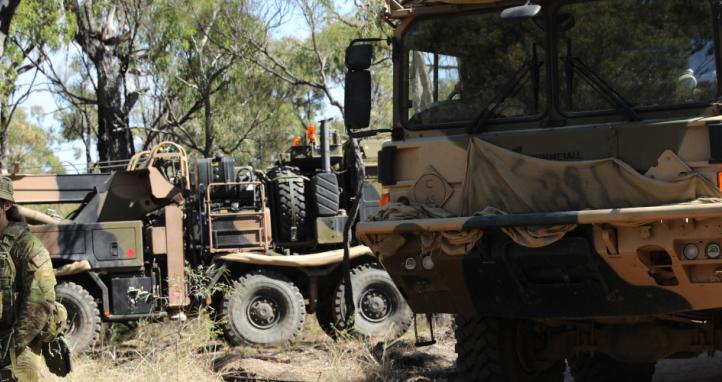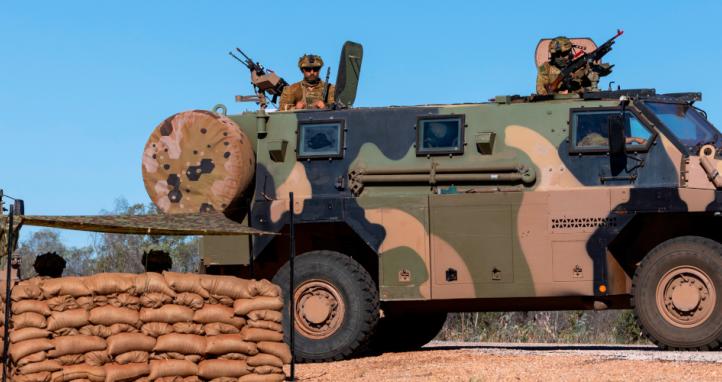This review was originally published in the Australian Army Journal Vol XVI, No 2 (2020), 125-127.
In the face of the reality and suffering of family and domestic violence (FDV), over the last decade Defence has increased support and referral services for those affected and developed focused training for all members. As a chaplain, I am eager to understand the complex dynamics that triggers or allows FDV to occur. How we can better help victims to access help? How can we better help soldiers avoid abusing their families and help perpetrators develop healthy and respectful behaviour? And how can those in Command, mental health and chaplaincy roles foster a culture more conducive to reducing the incidence of FDV? These are critical personnel questions that led me to No Visible Bruises.
Rachel Snyder is an investigative reporter who over the last decade has sought out stories and experiences of those affected by FDV. She prefers to use the label 'intimate partner terrorism', maintaining that part of the problem is seeing the issue as 'domestic' rather than the 'criminal' and even 'terrorist' behaviour that it is (pp. 10, 17). The book offers some helpful global overview of the issue. She quotes Former UN Secretary-General Kofi Annan labelling violence against women and girls as, 'the most shameful human rights violation'. A UN report explained that 50,000 women were killed by partners or family members in 2017, making home, 'the most dangerous place for women'. The global statistics are staggering, but the most impacting contribution of this book are the stories of the lived experience of individual victims, perpetrators and responders.
The first section focuses on the realities and experiences of victims. The narrative of victims like Michelle who was killed with her two children by Rocky illuminates the folly of asking, 'Why didn’t the victim leave?' Such questioning disregard the multilayered forces at work, often including alcohol, addictions, mental health, poverty, narcissism, manipulation, loss of agency, power imbalances and coercive control. The better question to ask, Snyder suggests, is, 'How do we protect this person?' Interweaved in the stories are some of the best tools developed over recent decades, especially Jacquelyn Campbell’s 'Danger Assessment' that maps indicators and timelines to warn service providers of those most at risk. Neil Websdale’s obsession with after action reviews of what goes wrong in responding to FDV was also fascinating reading. The section includes insights into the kind of 'code language' victims may use and helpful questions to ask.
Snyder turns from a victim to a perpetrator focus in section 2. It is a brave journalistic move to ask about violence from the perspective of abusers. These stories show the effects of toxic masculinity and describe some programs that cater for abusers. For example, an 'RSVP' program developed for use in prisons uses a manalive™ curriculum, principles of restorative justice and a peer-led group to help men realise their attitudes about male roles and the lies they have been fed about violence. Snyder weaves theoretical and therapeutic frameworks into the narratives. The three that I particularly appreciated were, firstly, Brene Brown’s work which shows how shame is organised by gender: for women, it often involves a competing set of expectations regarding family, relationships and work; whereas for men, it is usually about not being perceived as weak. Secondly, Ellen Pence’s 'Power and Control Wheel' illustrates how an abuser uses various ways to exercise control: fear, isolation, emotional abuse, using children, bullying, denial, blame, financial control and verbal threats as well as brute force. Thirdly, David Adams identified that perpetrators are often clinically narcissistic – obsessively concerned with their own needs and not aware of the impact on their victims. He also noted friends of perpetrators are often surprised to hear of FDV. They can be charming and funny and do not necessarily display their anger to the world. Adams comments, 'The most surprising thing is that [abusers] seem like normal guys. The average batterer is pretty likeable' (pp. 153-54). In organisations like Army, this is one of the big hindrances to identifying abusers because colleagues tend to think, 'He’s a good guy' and good at his work and then overlook character flaws, misogynist attitudes and dysfunctional behaviour.
The third section describes stories of change makers on the front line of responding to FDV and FDV homicide – advocates, helpline counsellors, refuge shelter providers, the #MeToo movement and law enforcement. One important lesson is that FDV needs to be confronted and disrupted at the misdemeanour phase – we need respect for women at all levels; and for disrespect and inappropriate behaviour to be called out wherever it occurs. Snyder has learned from and celebrate heroes like Detective Martina Latessa, a dedicated FDV detective in Cleveland. Latessa emphasises the importance of listening to victims – inviting their voice and not treating them as weak and powerless. 'These victims of domestic, they never have a voice. They can’t have an opinion at home. [Abusers] tell them to shut up; don’t talk to me … So if I sit down with them, you’ll see them struggle to get the story out' (p. 248). Latessa warned Snyder she cusses to underline her point about the need for patience and listening as part of good investigative technique: 'Sometimes policemen and detectives need to shut the f**k up and listen' (p. 249).
The main value of No Visible Bruises is the opportunity it gives readers to listen to the voices of victims, perpetrators and responders. It offers sobering, heartfelt, tragic but helpful perspectives that have informed my chaplaincy support and character training. I recommend it to other chaplains, service providers and commanders across Army and Defence.
For confidential support for anyone affected by family and domestic violence phone 1800RESPECT (1800 737 732). Defence members are encouraged to reach out for support through their chain of command, chaplains and/or Defence Community Organisation (DCO) on 1800 624 608 or defencefamilyhelpline@defence.gov.au.









